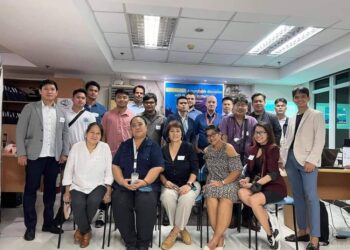Having old and long-retired seafarers as instructors in schools and the lack of assurance for their onboard training was among the top issues raised by some of the country’s future marine officers as they try to add their voice to the discussions on maritime education and training (MET).

A group of cadets from different maritime higher education institutions (MHEIs) across the country gathered recently to assert their rightful space in the seafaring industry and to come out with proposals to help address long-standing issues in the country’s MET and enhance their chances of success in their future career as seafarers and beyond.
The forum, dubbed “Kami Naman: A Roundtable Discussion with the Youth in Maritime,” was spearheaded by a young deck officer, an IMO Goodwill Maritime Ambassador; Yrhen Bernard Sabanal Balinis, to solicit feedback from cadets with the strategic goal of empowering them to speak out on their future profession.
During the forum, held at Scandic Palace in Barangay Palanan, Makati, the cadets or “early career professionals,” as 3O Balinis described them, proposed that MHEIs should hire instructors who are still active in the seafaring profession both deck and engineer officers.
Though it would entail some investments for MHEIs, one way to implement this proposal is for schools to “offer higher salaries to attract younger seafarer-instructors.” Obviously, this is easier said than done.
Another proposal that appears more feasible is to seek the full cooperation of industry stakeholders in crewing in adopting “the concept of ‘shipboard rotation’ where faculty members will have minimum [shorter] contracts to allow them to teach” in maritime schools. MHEIs may very well tap their alumni, who are active marine officers, to teach.
Another way is to coordinate with training providers to allow MHEIs to forge a partnership with training centers so that these can share the technical expertise of their instructors with the students of the higher education institutions. MHEI faculty members can also have an immersion program with the training centers to update their technical knowledge of the profession.
Expectedly, the cadets also touched on the lack of cadetship berths, but they only called for benchmarking of schools based on their capability to provide berths for cadetship training for their students so senior high school graduates would know where to enroll.
Read Also: Some Nautical Terms And What They Mean
The early career professionals strongly questioned the benefits of using cadets to serve as utilities at the offices and the role of the company’s security guards. “They should only pre-screen applicants and not act as hiring managers,” complained the cadets.
Among the participants in the forum include cadets from the Pangasinan Merchant Marine Academy in Pangasinan, Mariners’ Polytechnic Colleges Foundation in Albay, NYK-TDG Maritime Academy in Laguna, Aklan Polytechnic College in Aklan, John B Lacson Foundation Maritime University in Iloilo, Capitol University in Misamis Oriental, and another maritime school in Bohol.
Some members of the Maritime Journalists Association of the Philippines also joined the discussion as well as executives of AST and crewing managers, which sponsored the forum.
Kindly like us on Facebook/twitter















